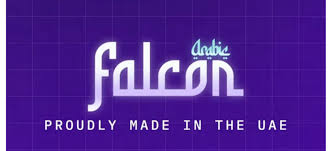Homegrown AI in UAE: Falcon, Jais, and the Future of Chatbot Technology

Artificial intelligence is now a reality that is influencing businesses, politics, and daily life rather than a sci-fi fantasy. While Western tech behemoths like OpenAI, Google, and Anthropic receive most of the attention in the world of artificial intelligence, the United Arab Emirates (UAE) has been quietly developing its own powerful AI ecosystem. Two groundbreaking projects—Falcon and Jais—have positioned the UAE as a frontrunner in AI chatbot development, particularly for Arabic-speaking communities.
In this blog, we’ll explore how Falcon and Jais are redefining the future of chatbots, why homegrown AI matters, and how the UAE is setting benchmarks for innovation in the global AI race.
1. The UAE’s Bold AI Vision
The UAE has long embraced innovation as a cornerstone of its growth strategy. From investing in smart cities to pioneering e-government services, the country is consistently ahead of the curve in adopting transformative technologies.
Key drivers behind the UAE’s AI focus:
- National AI Strategy 2031: A government-led initiative to position the UAE as a global AI leader.
- Digital-first governance: AI-powered services streamline visa processing, healthcare, and financial operations.
- Arabic language support: Global AI tools often prioritize English, leaving a gap for Arabic-speaking users. The UAE is filling that gap with homegrown models.
This vision paved the way for AI chatbot development in the UAE, leading to innovations like Falcon and Jais.
2. Introducing Falcon: UAE’s Flagship AI Model
Developed by the Technology Innovation Institute (TII) in Abu Dhabi, Falcon is one of the world’s most advanced open-source large language models (LLMs).
Why Falcon is a game-changer:
- Open-source accessibility: Unlike closed models such as GPT-4, Falcon is open to researchers and developers worldwide.
- High performance: Ranked among the top LLMs globally in benchmarks for natural language understanding.
- Arabic focus: Designed with capabilities that better understand Arabic dialects, making it ideal for regional chatbot development.
- Global recognition: Falcon has been downloaded hundreds of thousands of times, cementing the UAE’s place in the global AI landscape.
For chatbots, Falcon offers an opportunity to create assistants that are culturally aware, multilingual, and tailored to local needs.
3. Jais: The Arabic-Centric Language Model
While Falcon is globally focused, Jais—a collaboration between G42, Mohamed bin Zayed University of Artificial Intelligence (MBZUAI), and Cerebras Systems—is specifically designed for Arabic and English bilingual contexts.
Key features of Jais:
- Arabic-first approach: Trained on massive datasets covering Arabic dialects, literature, and modern usage.
- Bilingual fluency: Bridges the gap between Arabic and English, making it ideal for the multicultural UAE.
- Open-source contribution: Like Falcon, Jais is available to researchers, fueling regional AI innovation.
- Enterprise adoption: Banks, educational institutions, and government bodies are already testing Jais-powered chatbots.
This makes Jais an essential building block for Arabic AI chatbots that can finally match the quality of their English counterparts.
4. The Role of Chatbots in the UAE’s Digital Future
The demand for chatbots in the UAE is surging as businesses and governments embrace AI-powered automation.
4.1 Government and Smart Cities
- E-government portals integrate chatbots to answer citizen queries instantly.
- Smart Dubai initiatives leverage chatbots for city services, tourism, and public information.
4.2 Banking and Finance
- Banks like Emirates NBD are using AI chatbots for 24/7 customer service.
- Falcon and Jais offer better support for Arabic-speaking clients, increasing inclusivity.
4.3 Healthcare
- Chatbots powered by Jais can offer medical advice in Arabic, bridging language barriers.
- Virtual assistants handle appointment booking and insurance queries.
4.4 Education and Training
- Falcon-powered tutors deliver personalized learning experiences.
- Jais chatbots provide bilingual support for international students studying in UAE universities.
In all these sectors, AI chatbot development in the UAE is creating more localized, efficient, and user-friendly digital services.
5. Why Homegrown AI Matters
The UAE’s investment in Falcon and Jais is more than just technological advancement—it’s about strategic independence and cultural relevance.
- Data Sovereignty: Homegrown models ensure sensitive regional data stays within national borders.
- Cultural Alignment: Chatbots trained on local contexts provide more relevant and respectful interactions.
- Economic Growth: AI innovation boosts tech entrepreneurship, creating opportunities for startups and developers.
- Global Competition: By competing with OpenAI and Google, the UAE positions itself as a serious player in the AI race.
6. Challenges Ahead for Falcon and Jais
While Falcon and Jais are promising, scaling them for global use comes with hurdles:
- Resource intensity: Training LLMs requires massive compute power and infrastructure.
- Continuous improvement: Language evolves quickly, requiring constant dataset updates.
- Bias and accuracy: Ensuring chatbots remain unbiased and factual is a major challenge.
- Global competition: Giants like OpenAI, Google, and Anthropic invest billions in AI research.
Overcoming these challenges will determine how far Falcon and Jais can scale internationally.
7. The Future of Chatbot Technology in the UAE
The next five years will be transformative for AI chatbot development in the UAE. Expect major advancements in:
- Multimodal Chatbots: Combining text, voice, and image for seamless communication.
- Industry-Specific Solutions: Tailored chatbots for banking, tourism, education, and healthcare.
- Arabic Voice Assistants: Expanding beyond text to natural, fluent voice conversations.
- AI Regulation & Ethics: The UAE will likely pioneer AI governance frameworks for safe chatbot use.
- Regional Expansion: Falcon and Jais will extend their impact to the wider Middle East and North Africa (MENA).
Conclusion
Falcon and Jais, two domestic AI projects in the United Arab Emirates, are not only technological achievements but also significant turning points in the development of chatbot technology. The UAE is laying a solid basis for AI chatbot development that appeals to both domestic and international users by emphasizing enterprise applications, open-source innovation, and support for the Arabic language.



